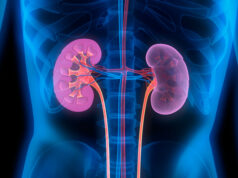
The continuous glucose monitoring market is dominated by the likes of Dexcom and Medtronic, to name a couple, but another company recently received a regulatory nod from the Food and Drug Administration that appears to up the game as far as consumer convenience goes.
Germantown, Maryland-based Senseonics Holdings announced Friday that its next generation Eversense E3 CGM system — whose sensor life lasts six months —had been approved by the FDA. An earlier version of the device approved in 2018 could be worn by patients with diabetes for up to three months.
Aside from the convenience factor, the Eversense CGM also delivers on patients’ desire to have an accurate long-lasting monitor, according to the company.
“Further extending the duration of the longest lasting CGM system to six months represents a massive leap forward for patients and towards our mission of transforming lives in the global diabetes community,” said Tim Goodnow, president and Chief Executive Officer of Senseonics, in a statement. “The review was delayed by one year due to Covid-19 priorities and now together with our partner Ascensia, we can execute our launch plan to deliver the Eversense E3 CGM System to U.S. patients beginning in the second quarter.”
The Eversense E3 is for people with diabetes who are 18 and older. Like other CGMs, it’s meant to provide better glycemic control and ultimately replace fingerstick calibration. However, finger prick measurements are still required for calibration, when symptoms don’t match CGM information or when taking medications in the tetracycline class, the company said.
Unlike the Eversense E3 sensor, other CGMs need sensors to be replaced every three to 10 days, depending on the brand. A Dexcom G6 sensor can be worn up to 10 days, though it doesn’t need fingerstick calibration if used with a sensor code. Medtronic’s Enlite glucose sensor can be worn for up to six days at a stretch and its Guardian Sensor 3 for up to seven days. Its CGM sensors do require calibration.
While the Eversense E3 sensor avoids more frequent replacement, it needs to be implanted by a qualified medical professional whereas those of Medtronic and Dexcom can be done by users themselves. The distributor of the Eversense E3 CGM system — Ascensia Diabetes Care — is working with payers to win reimbursement for this new CGM system and expects to ship the product in the second quarter.
“Ensuring that as many people as possible have access to Eversense E3 is key for us and we’ll be introducing a program to help users experience Eversense affordably as we work closely with payers on coverage,’ said Robert Schumm, president, Ascensia Diabetes Care, said, in a news release Monday.
Photo: gustavofrazao, Getty Images







